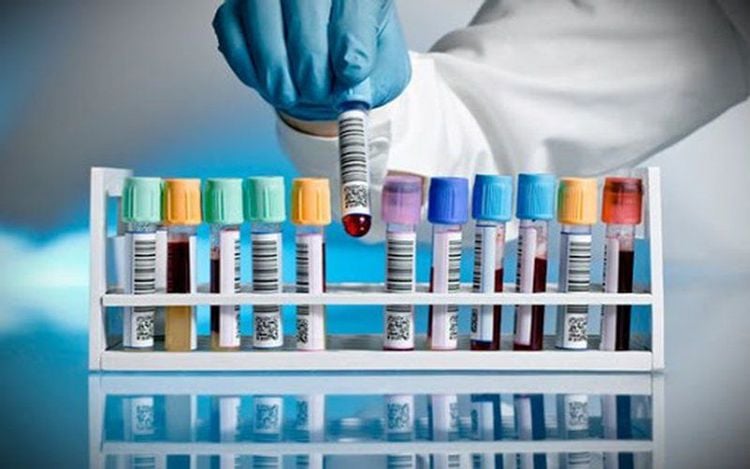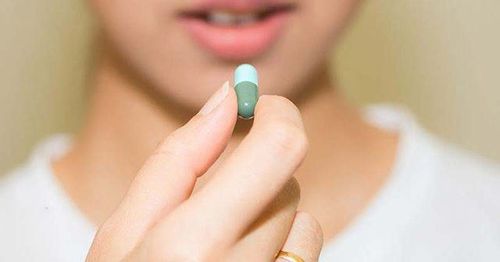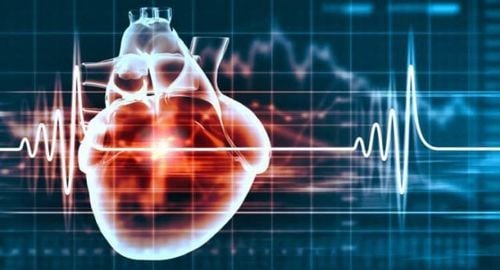This is an automatically translated article.
Blood test not only tells about biochemical indicators but also evaluates thyroid function such as TSH, FT3, T4, TSI,... Based on these indicators, the doctor can diagnose and give appropriate treatment regimen for each specific disease condition.
1. Function of the thyroid gland
The thyroid gland is a small step-shaped endocrine gland, located adjacent to the trachea in the front of the neck. The thyroid gland plays an important role in secreting hormones such as Tri-thyronine (T3) and thyroid hormone Thyroxine (T4) that help regulate the functioning of organs and cells in the body.
Tuyến giáp nằm ở vị trí ngay trước cổ
2. Tests to assess thyroid function
There are many types of thyroid function tests, depending on your medical history and symptoms, the doctor will order tests to evaluate thyroid function as follows:
Thyronxine (T4) T4 real The substance is a storage hormone and is incapable of producing energy or transporting oxygen to cells in the body. To become T3, T4 must undergo deiodization and lose 1 iodine atom.
The total T4 test is a method done to measure the amount of thyroxine currently circulating in a patient's blood. This method is commonly used in the diagnosis and measurement of thyroid function. However, the test that measures total T4 can be affected by the amount of protein in the blood, specifically the protein that can bind red blood cells to T4 to turn T4 into its active form. Meanwhile, free T4, which is considered an active form of thyroxine, is unaffected by blood proteins.
Currently, in the diagnosis and management of thyroid diseases, many endocrinologists do not use quantitative tests of free T4 or total T4, but only use TSH test results.
Triiodothyronine (T3) T3 is an active hormone produced by deiodination of T4. Similarly, the total T3 test measures the total amount of Triiodothyronine in the blood (including both unbound and protein bound T3). The free T3 test only measures the amount of T3 bound to the protein, which is the form of T3 that is capable of transporting energy and oxygen to cells.
RT3 or reversed T3 is secreted in times of stress, in an inactive form. Because of its low clinical significance, the RT3 test is rarely indicated. However, the RT3 test is important in determining thyroid hormone imbalance.
Thyroid Stimulating Hormone TSH TSH is a hormone in the pituitary gland that is responsible for transmitting signals to the thyroid gland. Specifically, when the pituitary gland detects too much thyroid hormone in the blood, it will limit the production of TSH so that the thyroid gland reduces the production of thyroid hormone. Conversely, when the pituitary gland detects that there is too little thyroid hormone in the blood, it actively produces TSH to promote thyroid hormone production in the thyroid gland.
Thyroid peroxidase antibody (TPOAb) TPOAb is an antibody produced by the body that inadvertently attacks and destroys healthy, functioning thyroid tissue. Thyroid function tests show the presence of TPOAb antibodies in the blood, which means that the body has one of the autoimmune thyroid diseases such as Grave or Hashimoto's thyroiditis. Thyroid Stimulating Immune Globulin (or TSI) is an antibody that has the ability to stimulate the thyroid gland to increase activity and promote the production of excessive amounts of Thyroid Hormone into the bloodstream.
Thyroglobulin (Tg) Tg is a protein produced by the thyroid gland. The Tg test is often indicated as valuable for patients diagnosed with thyroid cancer to:
Check whether the cancer cells are still producing Tg before cancer treatment. Evaluation of the effectiveness of cancer treatment. Assess the risk of cancer recurrence after treatment. Thyroglobulin (TgAb) Antibody TgAb is an antibody produced in response to the presence of Thyroglobulin in the body. When Thyroglobulin is abnormally elevated, the body produces TgAb to protect the body from the progression of thyroid diseases.

Có nhiều loại xét nghiệm để chẩn đoán các bệnh về tuyến giáp
3. Results in blood tests related to thyroid function
Blood test results related to thyroid function are considered completely normal if they fall within the following limits:
T4: 60 – 140 nmol/L T3: 1.1 – 2.7 nmol/L TSH index: 0.4 – 4.0 mU/L FT3 index: 3.5 – 7.8 pmol/L FT4 index: 10 – 26 pmol/L Clinical significance of the results in thyroid function test
low FT4 and high TSH: primary hypothyroidism caused by thyroid disease such as Hashimoto's thyroiditis. Low FT4 and low TSH: hypothyroidism secondary to a reaction to a non-thyroid disease or to a disease involving the pituitary gland. Increased FT4 and low TSH: hyperthyroidism such as Graves' disease. FT4 is within safe limits but TSH is slightly elevated: asymptomatic hypothyroidism. Thyroid autoantibody tests such as TgAb, TPOAb, or TRAb may be ordered in cases of suspected autoimmune thyroid disease or early findings suggesting signs of thyroid dysfunction. .
When experiencing any symptoms that are suspected to be related to thyroid diseases such as fatigue, tachycardia, unexplained weight loss, sweating, eye irritation, etc., the patient needs to seek medical attention. immediately to reputable facilities to do tests to evaluate thyroid function, thereby being diagnosed and treated promptly.
Currently, Vinmec International General Hospital has a screening package for thyroid diseases. Vinmec's screening package for thyroid diseases helps:
Check thyroid function. Screening & early detection of common thyroid diseases such as simple goiter, hyperthyroidism, hypothyroidism, thyroiditis, thyroid nodules, thyroid cancer, etc. appropriate and timely treatment.. To register for examination and treatment at Vinmec, please go directly to Vinmec health system or register online HERE.
MORE:
Normal levels of thyroid hormones T3, T4 Do children with congenital hypothyroidism develop normally? Where is the thyroid gland located and what is its function?













